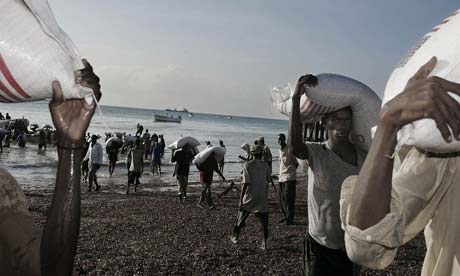The UN's biggest humanitarian aid agencies, which house and feed over 100 million people, are facing a deep - and potentially long term - crisis of funding as governments across the globe slash their aid budgets. Despite cutting over $1bn (£650m) from its budget for the next year, largely through savings in the cost of fuel, the World Food Programme yesterday revealed that it would struggle to meet its commitments to feed 49 million people in 12 of the world's most hunger-stricken countries and was already planning to cut rations, including to Zimbabwe and Ethiopia.
The WFP requested $5.2bn from international donors for 2009, but has so far managed to raise barely $500m in guaranteed pledges, with $450m tied to the crisis in Darfur, leading to warnings that warehouses for some of its most critical operations could run out of food.
"Globally, hunger is on a march," said the organisation's executive director, Josette Sheeran, visiting India yesterday.
"The food crisis itself has hit the world harder than I would have ever expected," she added. "We expect the financial crisis will add to the pressure on the world's most vulnerable."
If remaining pledges were received tomorrow, officials at the organisation say, it would take three months to process the cash into deliverable food aid, leaving the organisation facing a severe shortfall in the next quarter of next year.
Without a rapid injection of funds, the organisation adds, life-saving food assistance operations will come under threat in the new year in Bangladesh, Chad, Haiti, Kenya, Uganda and the Democratic Republic of the Congo. Food aid operations in Afghanistan, Sudan and Somalia could also be jeopardised without new funding by the middle of the year.
African leaders have already expressed fears that the rich world could cut aid budgets because of the global financial crisis. The World Food Programme's problems come as the UN high commissioner for refugees (UNHCR) has admitted that it has also seen a sharp drop in donations for its aid efforts.
At a conference in Geneva last week donations from governments for the organisation which cares for 33 million people were down 6%. "This is of grave concern," said Peter Kessler of UNHCR yesterday. "At present we are concerned we could lose up to $100m by the end of next year from currency fluctuations alone. It is happening as we are aware that government and individuals and private foundations are cutting back on what they are prepared to fund."
"Agencies have different funding structures," said Greg Barrow of the WFP in Rome yesterday. "We raise our budget almost entirely from voluntary donations from governments, almost 95%. We have managed to revise our budget down for next year by almost $1bn. But what we are concerned about is the 12 biggest humanitarian emergencies. We do not have enough confirmed donations for nine of them and we are already having to cut rations in Ethiopia and Zimbabwe." The WFP is also capping the size of families it can support to six and telling larger families they will have to share their food. "It is the only way that we can stretch the resources," Barrow said.
Nearly 4 million Zimbabweans receive monthly food rations from the WFP, which hopes to feed 5.1 million - almost half the population - from January. So far donors have contributed only $16m towards a $140m WFP appeal, leading to smaller distributions of maize and beans to families in the past two months, according to a WFP spokeswoman, Emilia Casella.
A long period of high food prices that have yet to drop in many local markets has been combined with the effects of the global downturn on developing economies and on remittances from family members working abroad which have helped support families.
Sheeran pointed out that 1% of the money being used to fund financial bailouts in Europe and the US could entirely fund the WFP's operations.
"As we take care of Wall Street and main street, we can't forget the places that have no streets," he said.








